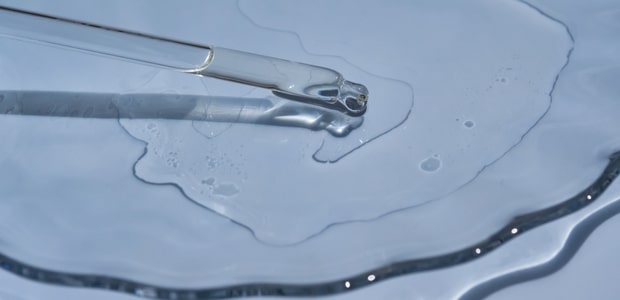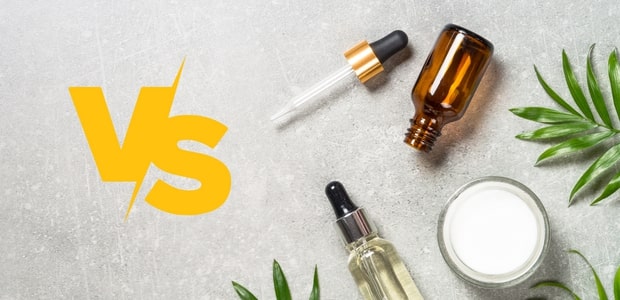Natural Ingredients for Healthy, Glowing Skin: Squalane, Jojoba Seed Oil and Oat Peptide
Table of Contents:[hide]
Introduction
Welcome to our blog post on the benefits of natural ingredients for healthy, glowing skin. In this article, we'll explore the powerful effects of three natural skincare ingredients: Squalane, Jojoba Seed Oil, and Oat Peptide. We'll discuss how these ingredients work, their benefits for your skin, and how to incorporate them into your daily skincare routine. We believe that using natural ingredients is the key to achieving healthy, radiant skin without exposing yourself to harmful chemicals. So, let's dive in and explore the world of natural skincare!
Squalane

What is squalane?
Squalane is a natural substance found in the skin, but its production decreases as we age. Squalane used in skincare products is typically derived from plants like olives or sugarcane, making it a vegan and sustainable ingredient.
What are the Benefits of Squalane for Skin?
Moisturizing: Squalane is a lightweight oil that provides intense hydration without clogging pores. It helps to prevent water loss, keeping the skin moisturized and plump.
Anti-aging: Squalane has antioxidant properties that help protect the skin from damage caused by free radicals, which can lead to premature aging. It also supports collagen production, which is important for keeping the skin firm and elastic.
Healing: Squalane has anti-inflammatory properties that help to calm irritated skin and promote healing of wounds or acne scars.
Brightening: Squalane can also help to improve skin tone and reduce the appearance of dark spots and hyperpigmentation.
How to Use Squalane in Your Skincare Routine
Squalane is a versatile ingredient that can be used in various ways in your skincare routine.
Here are a few options:
- Apply a few drops of squalane to your face after cleansing and toning, but before moisturizing.
- Mix a few drops of squalane with your moisturizer to boost its hydrating effects.
- Use squalane as an under-eye treatment by gently tapping a drop or two under your eyes.
Frequently Asked Questions about Squalane
Can squalane remove dark spots?
While squalane can help to improve skin tone and reduce the appearance of dark spots, it is not a guaranteed solution for removing them completely.
Should you use squalane every day?
Yes, squalane is a gentle and non-irritating ingredient that can be used daily in your skincare routine.
Is squalane anti-aging?
Yes, squalane has antioxidant properties that can help protect the skin from aging caused by environmental stressors like pollution and UV rays.
How long does it take for squalane to work?
Squalane is a fast-absorbing ingredient, so you should see some benefits like increased hydration and improved skin texture within a few days to a week of using it regularly. However, for anti-aging benefits, it may take longer to see visible results.
Jojoba Seed Oil

What is jojoba seed oil?
Jojoba seed oil is extracted from the seeds of the jojoba plant, a shrub native to the southwestern United States. It has been used for centuries as a natural remedy for various skin conditions and is now a popular ingredient in many skincare products.
Here are some of the benefits of jojoba seed oil for skin:
Reduces inflammation: Jojoba seed oil is rich in anti-inflammatory properties, which makes it effective in reducing skin inflammation and irritation. It can be particularly helpful for those with eczema, psoriasis, or rosacea.
Moisturizes: Jojoba seed oil is a natural humectant, which means it helps to lock in moisture and keep the skin hydrated. It is easily absorbed by the skin without leaving a greasy residue, making it an ideal moisturizer for all skin types.
Improves skin elasticity: Jojoba seed oil is rich in Vitamin E, which helps to improve skin elasticity and reduce the appearance of fine lines and wrinkles. It also contains antioxidants that protect the skin from environmental stressors.
How to use jojoba seed oil in your skincare routine
Jojoba seed oil can be used on its own or mixed with other skincare products. Here are some ways to incorporate jojoba seed oil into your skincare routine:
As a moisturizer: Apply a few drops of jojoba seed oil to your face and neck after cleansing and toning.
As a makeup remover: Jojoba seed oil can be used to remove makeup, including waterproof mascara.
As a scalp treatment: Massage a few drops of jojoba seed oil into your scalp to help nourish and moisturize the hair follicles.
Frequently Asked Questions about jojoba seed oil
Can you apply it directly to skin?
Yes, jojoba seed oil is safe to apply directly to the skin.
Does it clog pores?
No, jojoba seed oil is non-comedogenic, meaning it does not clog pores.
Is it good for under eyes?
Yes, jojoba seed oil can help to moisturize and reduce the appearance of fine lines and wrinkles around the eyes.
Does it cause wrinkles?
No, jojoba seed oil does not cause wrinkles. In fact, its moisturizing and antioxidant properties can help to prevent and reduce the appearance of fine lines and wrinkles.
Incorporating jojoba seed oil into your skincare routine can help to improve the overall health and appearance of your skin.
Oat Peptide

What is oat peptide?
Oat peptide is derived from the proteins found in oats. It is a natural ingredient that is known for its moisturizing and soothing properties. Oat peptide is rich in amino acids, which are essential for healthy skin. It is also packed with antioxidants that help protect the skin from free radicals and environmental stressors.
Benefits of oat peptide for skin
Oat peptide has numerous benefits for the skin. Some of the most notable benefits include:
Reduces redness: Oat peptide has anti-inflammatory properties that help reduce redness and soothe irritated skin.
Soothes irritation: Oat peptide is an excellent ingredient for people with sensitive skin. It helps calm and soothe irritation caused by environmental stressors, such as pollution and UV rays.
Improves skin texture: Oat peptide is known to improve the texture and appearance of the skin. It helps to smooth out rough patches and leaves the skin feeling soft and supple.
Moisturizes: Oat peptide is a natural humectant, which means it helps the skin retain moisture. It is an excellent ingredient for people with dry skin.
How to use oat peptide in your skincare routine
Oat peptide can be found in various skincare products, including moisturizers, serums, and face masks. When using oat peptide, it is essential to follow the instructions on the product label. Here are some general guidelines:
✅ Start with a clean face: Before applying any skincare product, make sure your face is clean.
✅ Apply the product: Apply the product containing oat peptide to your face and neck, following the product instructions.
✅ Use regularly: To see the benefits of oat peptide, use it regularly as part of your skincare routine.
Frequently asked questions about oat peptide
What does oat do to the skin?
Oat peptide has numerous benefits for the skin, including reducing redness, soothing irritation, improving skin texture, and moisturizing the skin.
Can oat peptide be used on sensitive skin?
Yes, oat peptide is an excellent ingredient for people with sensitive skin. It helps calm and soothe irritation caused by environmental stressors, such as pollution and UV rays.
What types of products contain oat peptide?
Oat peptide can be found in various skincare products, including moisturizers, serums, and face masks.
Comparison to Other Skincare Ingredients

When it comes to skincare ingredients, it can be overwhelming to decide which ones to use. Here's how squalane, jojoba seed oil, and oat peptide compare to other popular skincare ingredients.
Squalane vs. Hyaluronic Acid and Retinol
Squalane is often compared to other hydrating ingredients like hyaluronic acid. While both are effective at keeping the skin moisturized, there are a few differences between the two. Hyaluronic acid is a humectant, meaning it draws water to the skin and helps it stay hydrated. On the other hand, squalane is an emollient, which means it forms a protective barrier on the skin to prevent moisture loss.
Retinol, on the other hand, is a powerhouse ingredient for anti-aging. It stimulates collagen production and helps reduce the appearance of fine lines and wrinkles. While squalane can also improve collagen production, it doesn't have the same anti-aging effects as retinol.
Jojoba Seed Oil vs. Other Oils
Jojoba seed oil is a popular oil used in skincare, but how does it compare to other oils? One of the benefits of jojoba seed oil is that it closely resembles the natural oils in our skin, making it a great choice for all skin types. It's also non-comedogenic, meaning it won't clog pores. Other popular oils used in skincare, like coconut oil and olive oil, can be comedogenic and may cause breakouts.
What Makes Oat Peptide Unique
Oat peptide is a lesser-known ingredient in skincare, but it has unique benefits that set it apart from other plant-based ingredients. It's a natural anti-inflammatory, which can help reduce redness and irritation in the skin. Oat peptide also contains antioxidants that protect the skin from environmental stressors and improve overall skin texture.
In summary, while there are many effective skincare ingredients out there, squalane, jojoba seed oil, and oat peptide all offer unique benefits that make them worth incorporating into your skincare routine.
Conclusion
Using natural ingredients in your skincare routine can have a significant impact on the health and appearance of your skin. Squalane, jojoba seed oil, and oat peptide are just a few examples of effective plant-based ingredients that offer numerous benefits for the skin.
Squalane helps to moisturize and nourish the skin while also promoting anti-aging effects and collagen production. Jojoba seed oil is a powerful anti-inflammatory that also provides deep hydration and improves skin elasticity. Oat peptide is great for reducing redness and irritation while also improving overall skin texture.
When compared to other popular skincare ingredients like hyaluronic acid and retinol, these natural ingredients offer unique and valuable benefits for the skin.
Incorporating natural ingredients into your skincare routine is an easy and effective way to achieve healthy, glowing skin. So why not give these products a try and see the results for yourself?
Thank you for reading! Don't hesitate to share this post with your friends and family.
References:
- Moisturizers: The Slippery Road. Indian J Dermatol. 2016 May-Jun; 61(3): 279–287. doi: 10.4103/0019-5154.182427
- Biological and Pharmacological Activities of Squalene and Related Compounds: Potential Uses in Cosmetic Dermatology. Molecules. 2009 Jan; 14(1): 540–554. Published online 2009 Jan 23. doi: 10.3390/molecules14010540
- Anti-Inflammatory and Skin Barrier Repair Effects of Topical Application of Some Plant Oils. Int J Mol Sci. 2018 Jan; 19(1): 70. Published online 2017 Dec 27. doi: 10.3390/ijms19010070
- Plant and Microalgae Derived Peptides Are Advantageously Employed as Bioactive Compounds in Cosmetics. Front Plant Sci. 2019; 10: 756. Published online 2019 Jun 12. doi: 10.3389/fpls.2019.00756








